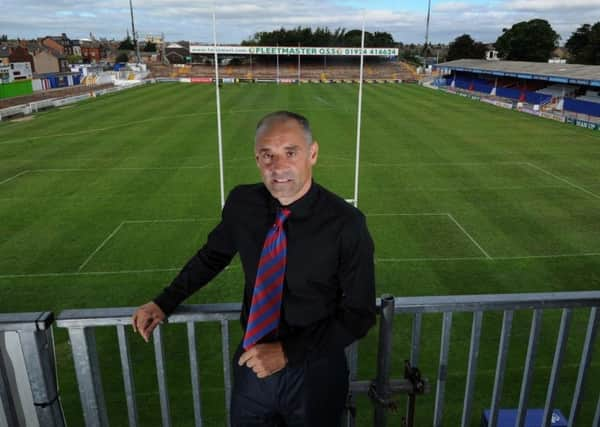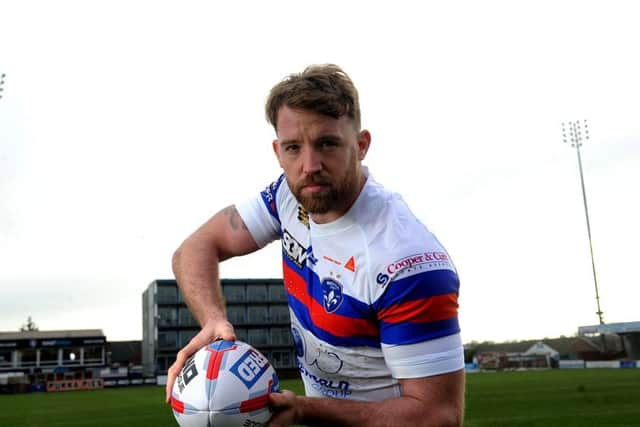Super League clubs keen to have greater say in key decisions


A representative from each of the 12 clubs now sits on the Super League board to essentially replace RFL chief executive Nigel Wood, who held a place among the directors before the organisational overhaul late last year.
Wood, of course, last week stood down from his RFL role and Roger Draper, the RFL chief commercial officer who also acted as Super League executive director, leaves at the end of the month..
Advertisement
Hide AdAdvertisement
Hide AdAlthough there is much speculation now about the future of how the domestic game will be run, and a potential power struggle between the two bodies, Carter maintains Super League merely wants to make sure it is more hands-on in its own approach.
Speaking to The Yorkshire Post, he explained: “As far as I’m concerned the Super League clubs have simply taken the decision to get back involved in the running of Super League.
“That’s all, really. What’s come to the fore over the last year to 18 months is that, if you disregard Leeds, Hull and potentially Castleford – who are now performing really well – it’s tough for all the clubs out there.
“We made a very, very small profit last year but that’s always been our remit; aim to break even. There are other clubs out there still making huge losses and reliant on owners to put money in. We all hear hearsay and get told tales about ‘this club got given that or this’ so we’ve taken a collective ruling that we just want to see more transparency within the sport when it comes to its running and the financial aspects of it. That’s how this started.”
Advertisement
Hide AdAdvertisement
Hide AdCarter claims that, under the previous regime, clubs had to wait too long for information and did not always receive detail.


“Super League clubs used to meet twice a year,” he explained.
“We’d get reports on all sorts of on and off-field operational stuff and in the October meeting there’d usually be a presentation – from Roger, Nigel and Mark Foster – saying along the lines of we’ve made a surplus of £1.2m and therefore there’s £100,000 back to each club.
“So, some of us would sit there and think ‘Great, we’ve 100 grand coming in, that might pay wages in December!’ But we never really saw any detail. We’d ask questions but it would be another six months until we met again. Things get forgotten in the meantime.
Advertisement
Hide AdAdvertisement
Hide Ad“Sometimes big issues were put to the vote but when you’re only meeting twice a year it’s difficult when you need immediate answers so you have to empower and trust the people you put in place to run your game.


“Now there’s a feeling that we needed to get more engaged again.”
Clearly, Super League believes it should have a greater say in how funds gleaned from the broadcast deal with Sky Sports – which expires in 2021 – should be dispersed.
Carter makes an interesting point, for example, about the appointment of England coach Wayne Bennett or an alternative view involving Castleford Tigers’ Daryl Powell.
Advertisement
Hide AdAdvertisement
Hide AdHe said: “Are we getting value for every pound that we spend in the sport – both Super League and RFL?
“Since it (TV deal) was first presented (2014), there’s been a lot of changes and clubs have lost track of how the money is flowing in and out, what goes down to the Championship, to League 1 and to the RFL. There is a wanting to understand the bones of that and, for example, if the RFL are spending ‘X’ amount on the England set-up and we got to the World Cup final, do we feel that is value for money?
“Or do we feel, for example, we could have gone to Castleford Tigers and said ‘we want your coaching staff for a month, here’s 50K, will you run the World Cup for us or next year’s Kiwi series?’
“There’s an element of the clubs wanting to understand who is making the decisions and how that money is being spent.”
Advertisement
Hide AdAdvertisement
Hide AdCarter revealed each club representative has now been tasked with digging deeper. He said: “As I’ve an accountancy background, I’ve been involved in seeing (RFL finance director) Tony Sutton with (St Helens’) Mike Rush, just trying to get to the bottom of what the broadcast deal actually is?
“It was important for me I understood how it worked financially as I’ve only been in the sport four years and I am still learning.
“But I also wanted to see whether there’d been a fairness over the four years I’ve been involved as when we first took over (at Wakefield) there was some pretty strict criteria put on us about what we could and couldn’t spend.
“Then you hear – again, with a pinch of salt – about other clubs being treated a little differently. That was at the back of my mind. Me and Mike met with Tony Sutton at Red Hall last Thursday and those meetings are ongoing.
Advertisement
Hide AdAdvertisement
Hide Ad“I’m hopeful the review we’re trying to undertake will take less than six months (as before); there’s an urgency to get better understanding within six weeks.
“(Wigan chairman) Ian Lenagan and a few others are looking at some of the legal aspects in agreements between the Super League, RFL and other outside bodies like Sky.
“I don’t think anyone from a club has actually had a proper look at the TV agreements. That is (alarming). But, again, it goes back to empowering people you have put in place to run the sport.”